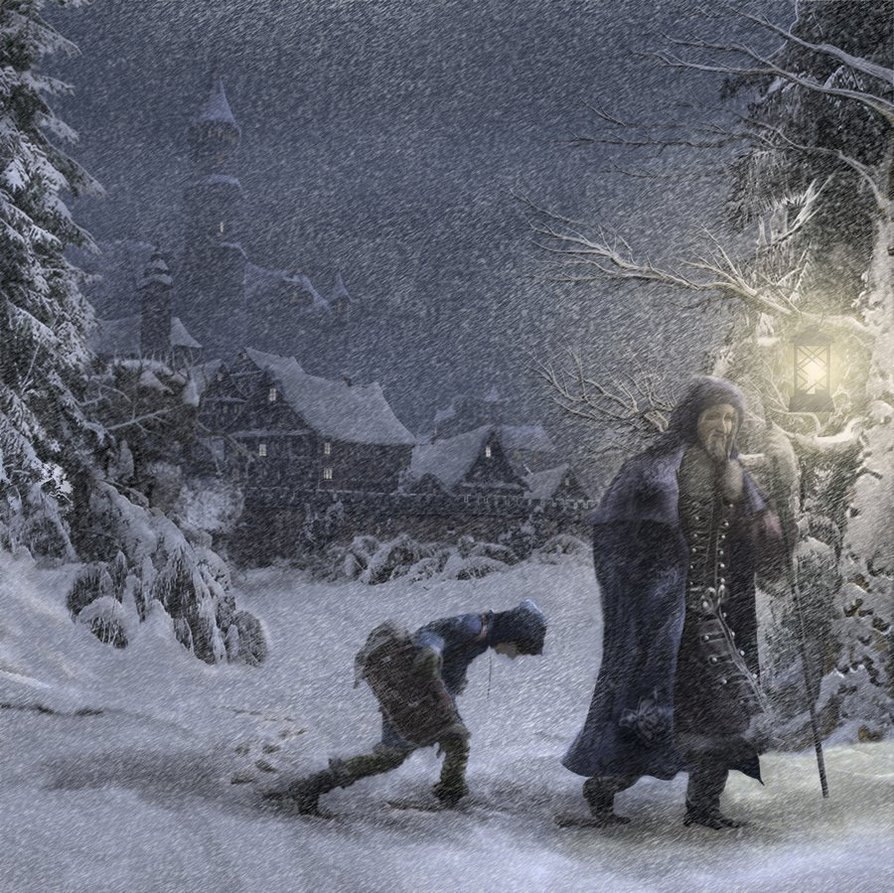
I’ve always enjoyed “Good King Wenceslas,” probably more for the tune than the actual lyrics. The tune is “Tempus adest floridum” (“It is time for flowering”), a 13th-century spring carol first published in the Finnish song book Piae Cantiones in 1582. It’s a delightful tune, probably originally intending to accompany dancing.
“Good King Wenceslas” tells a story of a king braving harsh winter weather to give alms to a poor peasant on the Feast of Stephen. During the journey, his page is about to give up the struggle against the cold weather, but is enabled to continue by following the king’s footprints, step for step, through the deep snow. The legend is based on the life of the historical Saint Wenceslaus I, Duke of Bohemia or Svatý Václav in Czech.
Wenceslas was born around A.D. 907 and nominally came to power as a young man in 921 on the death of his father, Duke Vratislaus. Vratislaus was a Christian, but his wife, Drahomira, who was the mother of Wenceslas, was a pagan. At the death of Vratislaus, a power struggle broke out between who would control the young duke, his Christian grandmother Ludmila or his pagan mother. Ludmila managed to raise him for some years, but Drahomira rallied the pagans among the nobility for political support and had the Christian Ludmila strangled. Wenceslas remained Christian and by all accounts was quite devout in his faith, and on assuming the actual reins of government had his heathen mother exiled.
“Good King Wenceslas” got involved in the many wars and political conflicts of his day, but managed to keep the Bohemian people free from external dominance, for which he remains a nationalist hero among the Czech people. He was known for his generosity to the poor and to the church. He founded a number of cathedrals, churches and monasteries.
Wenceslas was considered a martyr and a saint immediately after being assassinated by his wicked brother, Boleslaw the Bad, in 1935. A cult of Wenceslas grew up in Bohemia and in England. Within a few decades of Wenceslas’s death, four biographies of him were in circulation. These stories idealized his life and had a powerful influence on the High Middle Ages conceptualization of the rex justus, or “righteous king,” a monarch whose power stems from his great piety, as well as from his princely vigor. Wenceslas’s remains are interred in St Vitus’s cathedral in Prague, and he was recently made patron saint of the Czech Republic. Although Wenceslas was only a duke during his lifetime, Holy Roman Emperor Otto I posthumously “conferred on [Wenceslas] the regal dignity and title” and that is why, in the legend and song, he is referred to as a “king.”
The lyrics were written by J. M. Neale (1818-66), and it was first published in 1853. Neal was an Anglican priest. He also translated “O Come, O Come, Emmanuel.”
Good King Wenceslas looked out, on the Feast of Stephen,
When the snow lay round about, deep and crisp and even;
Brightly shone the moon that night, tho’ the frost was cruel,
When a poor man came in sight, gath’ring winter fuel.
“Hither, page, and stand by me, if thou know’st it, telling,
Yonder peasant, who is he? Where and what his dwelling?”
“Sire, he lives a good league hence, underneath the mountain;
Right against the forest fence, by Saint Agnes’ fountain.”
“Bring me flesh, and bring me wine, bring me pine logs hither:
Thou and I will see him dine, when we bear them thither.”
Page and monarch, forth they went, forth they went together;
Through the rude wind’s wild lament and the bitter weather.
“Sire, the night is darker now, and the wind blow stronger;
Fails my heart, I know not how; I can go no longer.”
“Mark my footsteps, my good page. Tread thou in them boldly
Thou shalt find the winter’s rage freeze thy blood less coldly.”
In his master’s steps he trod, where the snow lay dinted;
Heat was in the very sod which the saint had printed.
Therefore, Christian men, be sure, wealth or rank possessing,
Ye who now will bless the poor, shall yourselves find blessing.
Sources: Wikipedia, The Telegraph, Redlands Daily Facts
I always did wonder about that song
I had never heard of this song. Great illustration.
Love the background you gave once again! It’s a lovely song!